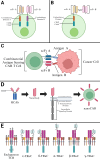Advances in CAR T cell therapy: antigen selection, modifications, and current trials for solid tumors
- PMID: 39835140
- PMCID: PMC11743624
- DOI: 10.3389/fimmu.2024.1489827
Advances in CAR T cell therapy: antigen selection, modifications, and current trials for solid tumors
Abstract
Chimeric antigen receptor (CAR) T cell therapy has revolutionized the treatment of hematologic malignancies, achieving remarkable clinical success with FDA-approved therapies targeting CD19 and BCMA. However, the extension of these successes to solid tumors remains limited due to several intrinsic challenges, including antigen heterogeneity and immunosuppressive tumor microenvironments. In this review, we provide a comprehensive overview of recent advances in CAR T cell therapy aimed at overcoming these obstacles. We discuss the importance of antigen identification by emphasizing the identification of tumor-specific and tumor-associated antigens and the development of CAR T therapies targeting these antigens. Furthermore, we highlight key structural innovations, including cytokine-armored CARs, protease-regulated CARs, and CARs engineered with chemokine receptors, to enhance tumor infiltration and activity within the immunosuppressive microenvironment. Additionally, novel manufacturing approaches, such as the Sleeping Beauty transposon system, mRNA-based CAR transfection, and in vivo CAR T cell production, are discussed as scalable solution to improve the accessibility of CAR T cell therapies. Finally, we address critical therapeutic limitations, including cytokine release syndrome (CRS), immune effector cell-associated neurotoxicity syndrome (ICANS), and suboptimal persistence of CAR T cells. An examination of emerging strategies for countering these limitations reveals that CRISPR-Cas9-mediated genetic modifications and combination therapies utilizing checkpoint inhibitors can improve CAR T cell functionality and durability. By integrating insights from preclinical models, clinical trials, and innovative engineering approaches, this review addresses advances in CAR T cell therapies and their performance in solid tumors.
Keywords: CAR T cell; cancer; immunotherapy; solid tumors; structure; targets.
Copyright © 2025 Khan, Choi, Veena, Lee and Shin.
Conflict of interest statement
JL has equity in and serves as a consultant for PromiCell Therapeutics. He is an inventor on a patent related to STEAP1 CAR T cell therapy. He also serves as a consultant for Lyell Immunopharma. The remaining authors declare that the research was conducted in the absence of any commercial or financial relationships that could be construed as a potential conflict of interest.
Figures




References
-
- Sadelain M, Brentjens R, Riviere I. The basic principles of chimeric antigen receptor (CAR) design. Cancer Discovery. (2013) 3:388–98. doi: 10.1158/2159-8290.CD-12-0548 - DOI - PMC - PubMed
-
- Locke FL, Ghobadi A, Jacobson CA, Miklos DB, Lekakis LJ, Oluwole OO, et al. . Long-term safety and activity of axicabtagene ciloleucel in refractory large B-cell lymphoma (ZUMA-1): a single-arm, multicentre, phase 1–2 trial. Lancet Oncol. (2019) 20:31–42. doi: 10.1016/S1470-2045(18)30864-7 - DOI - PMC - PubMed
Publication types
MeSH terms
Substances
Grants and funding
LinkOut - more resources
Full Text Sources
Medical
Research Materials

